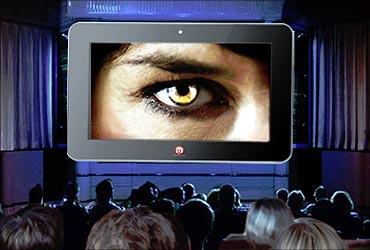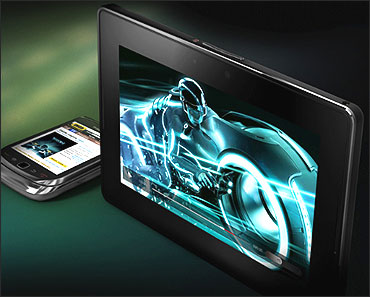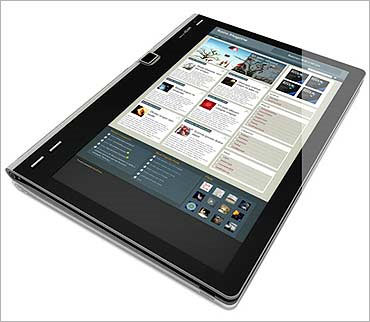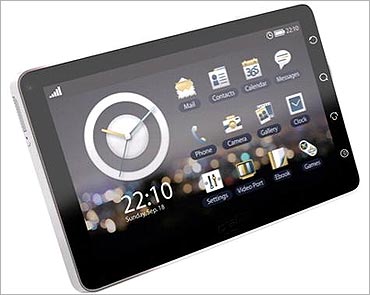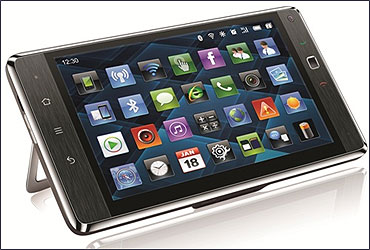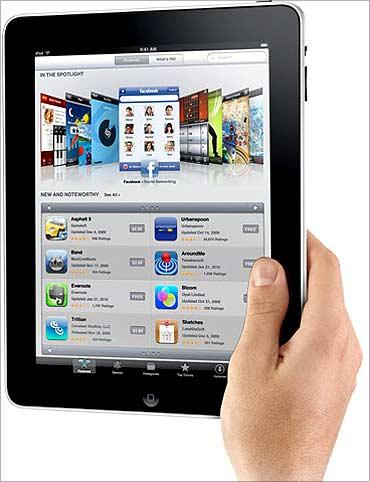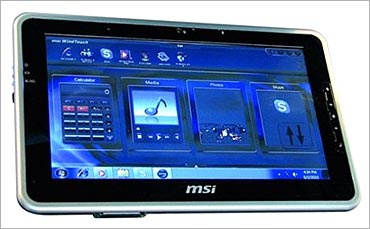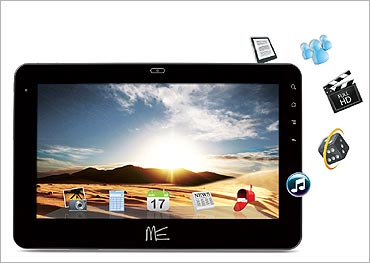 | « Back to article | Print this article |
Tablet PCs to spell doom for desktops, laptops?
Tablet PC will one day eclipse the desktop and laptop because of its portability and other advantages, while its older siblings will remain only to do sophisticated and specialised jobs, teachers of Computer Science and experts have predicted.
"Most of the work done by average home PCs or laptops can be done by Tablets.
"People on the move may not need to carry laptops and may not need desktops at all like they did earlier," Sugata Sanyal, Professor of Computer Science at the Tata Institute of Fundamental Research, Mumbai, says.
Click NEXT to read further. . .
Tablet PCs to spell doom for desktops, laptops?
Subhamoy Maitra, Professor of Computer Science at the Indian Statistical Institute, Kolkata, is ecstatic about Tablets.
"Tablets will bring a paradigm shift. Just wait till people are accustomed to small devices like they have done in case of mobile phones, particularly smart phones," he says.
Maitra cites how by using both their thumbs, members of the younger generation are able to type much faster on their cell phones compared to those who are in their 40s.
Click NEXT to read further. . .
Tablet PCs to spell doom for desktops, laptops?
"The same can be said of Tablets.
"After some years, may be children will carry Tablets to school. By that time it will become almost unbreakable and the parents will be able to observe movements of their children given the outstanding development in mobile communication," he says.
Not just students, business executives too are now opting for Tablet PCs.
"Many large companies are nowadays opting for IPads for their management executives as it has all the capabilities for conducting business," says Rahul Guha, vice-president of a Bengaluru-based company.
Click NEXT to read further. . .
Tablet PCs to spell doom for desktops, laptops?
"I see many Tablet applications show up which bridges the gap between office and home usages," says Guha, an engineer, who had earlier worked with Intel and Microsoft.
Small size will bring better mobility for a user compared to that of laptops, according to Maitra.
"One can use the laptop while on the move, but requires a car for that, whereas if I have a Tablet I can work on it sitting in a crowded bus," Maitra says.
But doesn't a Tablet have small memory space compared to desktops and laptops?
Click NEXT to read further. . .
Tablet PCs to spell doom for desktops, laptops?
"Yes," admits Maitra, "but from development of VLSI (very large-scale integration) related issues, it can be said the computational and storage power of small devices can very well compete with that of desktops."
VLSI is the current level of computer microchip miniaturisation where hundreds of thousands of transistors are kept in a single chip.
A key advantage of the Tablet is where it integrates with 3G and provides you the flexibility of cellphone, it doesn't need data cards, network cable or WIFI connection, says Guha.
Click NEXT to read further. . .
Tablet PCs to spell doom for desktops, laptops?
So, are the days doomed for laptops and desktops?
"High end jobs where sophisticated graphics facilities are required, or where we need very high speed calculations, we will still need high end PCs," says Sanyal. He is echoed by Maitra.
Guha, however, is sceptic on the sale of Tablets. "I see sale of Tablets increasing in India, but in near future mainly the low cost ones for typical Facebook, email usage."
Many low cost Tablet PCs have already flooded the market apart from international brands which are costly.
Click NEXT to read further. . .
Tablet PCs to spell doom for desktops, laptops?
"Connectivity, ease of use and fashion statement together will define the Tablet," says Guha.
Studies show the sale of desktops has become static in India while that of laptops shows a rising trend.
However, no reliable study is still available for Tablets.
Click NEXT to read further. . .
Tablet PCs to spell doom for desktops, laptops?
A study released last year by the Manufacturers Association of Information Technology, the apex body representing India's IT hardware, laptops, including netbooks, sales have triple from 850,860 in 2006-07 to 2,508,564 units in 2009-10, while Desktop sales remained static -- from 5,490,591 in 2006-07 to 5,525,992 in 2009-10.
However, both Guha and Sanyal feel it will take more time in India for sale of desktops to plummet significantly.
